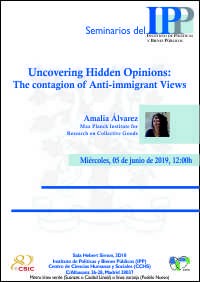Seminario IPP: "Uncovering Hidden Opinions: The contagion of Anti-immigrant Views"
Por Amalia Álvarez (Max Planck Institute for Research on Collective Goods)
Sala Herbert A. Simon 3D
Organiza: Francisco Herreros (IPP-CSIC)
Abstract: Social norms against the expression of hate prevent people from publicly expressing hostility towards minorities or support bigoted attitudes in public. Yet variations of the strength of the anti-hate norm occur, both locally and temporarily. This experiment seeks to explain the short-term dynamics of normative change induced by the observed pattern of behavior in a meaningful context, such as an online platform. In the experiment, the number of norm violations increases over time, which allows for empirically testing the dynamics that underline normative change, and the possible patterns of behavior.
Participants were invited to take part in an online forum discussing immigration issues. We manipulate the social acceptability of expressing prejudice by linearly increasing the proportion of hate comments - violations of the anti-hate norm. We recorded participants’ comments across all forum pages. A team of external raters classified the comments based on their social acceptability and hostility. Additionally, participants were given the possibility to make a donation to a well-known anti-immigration organization. The donation decision was randomized in a manner so different participants were asked to make the decision at different stages of the forum. We measure how the proportion of norm violations of the anti-hate norm influences both how the participants’ comments change over time and the decision to donate.
The empirical results show that participants exposed to norm violations were more prone to express anti-immigrant views and use hateful language. Overall, there is no apparent carry-over effect between the norm violations of the anti-hate norm and the donations. However, women reacted by reducing even more their donations when the anti-immigrant comments raised normative concerns. Results thus confirm that compliance with the anti-hate norm depends on the social acceptability inferred from the context.



